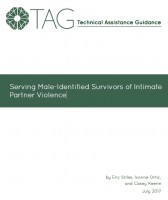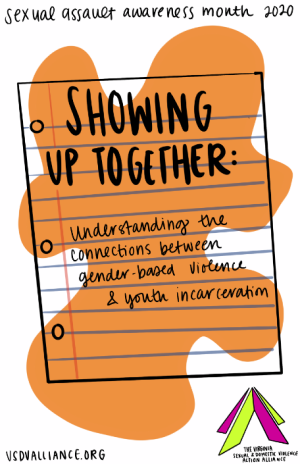Resources Library: Advocates
Start a Search:
Serving Male-Identified Survivors of Intimate Partner Violence

"Historically, domestic violence programs were born from the women’s liberation movement of the 1970s to address the needs of female survivors, who still represent the majority of victims seeking services today. Generally, the domestic violence movement has framed its work on a gender binary with men as perpetrators and women as victims. We have come to learn, however, that a woman-centered approach to advocacy only addresses the needs of a portion of survivors and largely fails to acknowledge and address male victimization."
A resource developed by the National Resource Center on Domestic Violence, this Technical Assistance Guidance supports advocates seeking to build capacity to recognize and respond to survivors across the gender spectrum, while honoring the gender analysis that helps us understand the root causes of violence and oppression.
Serving Survivors of Domestic Violence with Rapid Re-Housing
Kris Billhardt provided a great presentation at the 2016 Annual National Alliance to End Homelessness conference on serving Domestic Violence (DV) survivors with rapid re-housing (RRH). Former director of Volunteers of America in Multnomah County, Oregon, and current principal of her own consulting firm, Kris has worked in the domestic violence movement for over 30 years. Kris is a pioneer in finding housing solutions that meet the needs of DV survivors experiencing homelessness. And she has found over her many years of experience that housing solutions are central – not tangential – to helping DV survivors. Increased housing stability is a significant predictor of improvements for DV survivors in many areas of life:
- Increased safety, decreased vulnerability to abuse
- Lower levels of PTSD and depression
- Higher quality of life
- Increased ability to sustain employment
- Improvements in children’s outcomes
Click here to access the webinar slides.
Sexual Assault Awareness Month 2020: Showing Up Together

For Sexual Assault Awareness Month 2020, the Action Alliance created resources to highlight the connections between gender-based violence and youth incarceration. With our partners Performing Statistics and RISE for Youth, national and state-wide organizations dedicated to ending youth incarceration and building campaigns around #NoKidsInPrison, Showing Up Together: Understanding the Connections Between Gender-Based Violence & Youth Incarceration is a graphic pamphlet for advocates, preventionists, and people in community working to support survivors of violence and build towards a world free of violence and free of youth prisons.
Sexual Assault Demonstration Initiative - Publications and E-Learning Tools
As originally published by the National Sexual Violence Resource Center, the Sexual Assault Demonstration Initiative (SADI), the first large scale project of its kind, was created to enhance sexual assault outreach, services, and community partnerships in dual/multi-service programs. Six sites across the nation engaged in a four-year process of assessment, planning, and implementation of new and enhanced services and organizational capacity building. The materials that were developed based on the lessons learned across project sites can be found at https://www.nsvrc.org/sexual-assault-demonstration-initiative, many of which are avaiable in English and Spanish.
Topics include:
- - Foundations of Advocacy
- - Culturally Relevant Services for Tribal Communities and Communities of Color
- - Picturing Your Program: Planning for Organizational Growth
- - Listening to Survivors - Essential Steps for the Intake Process
- - Comprehensive Services for Survivors of Sexual Violence
- - Throw Away the Menu: Broadening Advocacy
- - It Matters! How Defining Sexual Violence Defines Advocacy Programs
- - Building Cultures of Care
- - Listening to Our Communities: Assessment Toolkit
- - Trauma-Informed Care
- - Lessons for Local Programs & SADI Timeline Overview
-
- and the Final Report
What is the Sexual Assault Demonstration Initiative (SADI) - Watch this brief overview to learn more about the Sexual Assault Demonstration Initiative (SADI) and the lessons learned from this national project.
Sexual Assault Response Teams (SART): A Model Protocol for Virginia
In 2004, the Virginia General Assembly passed legislation stating that “the Department of Criminal Justice Services shall promote the use of local and regional sexual assault response team policy and protocol, established pursuant to subdivision 46 of §9.1-102 of the Code of Virginia, as an integral part of an effective coordinated community response to sexual assault” (Virginia Acts of Assembly, Chapter 980). The Code directs that DCJS shall “establish training standards and publish a model policy and protocols for local and regional sexual assault response teams” (§9.1-102). In accordance with these legislative mandates, DCJS developed these guidelines based on review of existing state and national protocols and best practices and consultations with local Virginia sexual assault response team members. This model protocol focuses on adult sexual assault.

